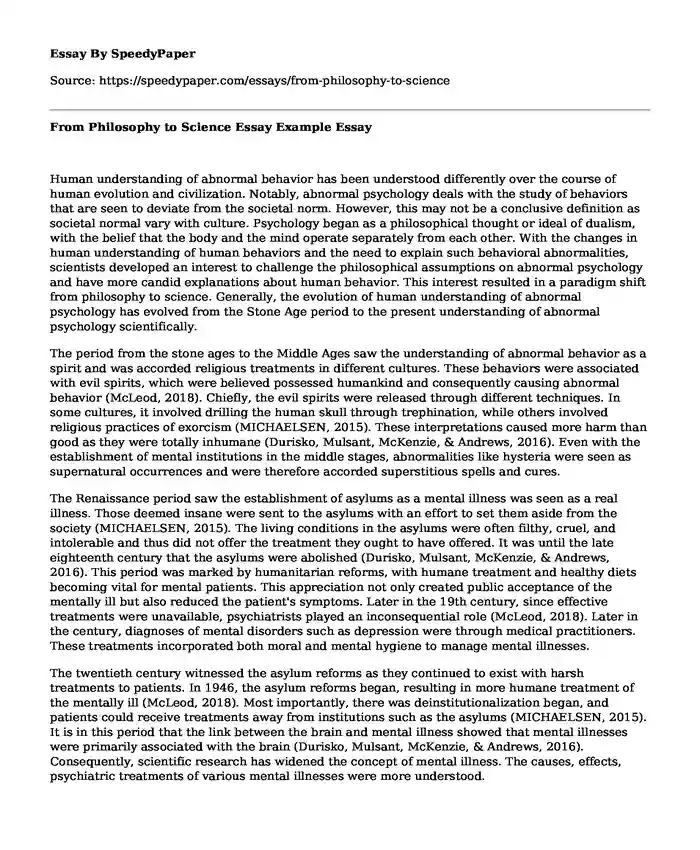
| Type of paper: | Essay |
| Categories: | Psychology Science Human behavior |
| Pages: | 3 |
| Wordcount: | 697 words |
Human understanding of abnormal behavior has been understood differently over the course of human evolution and civilization. Notably, abnormal psychology deals with the study of behaviors that are seen to deviate from the societal norm. However, this may not be a conclusive definition as societal normal vary with culture. Psychology began as a philosophical thought or ideal of dualism, with the belief that the body and the mind operate separately from each other. With the changes in human understanding of human behaviors and the need to explain such behavioral abnormalities, scientists developed an interest to challenge the philosophical assumptions on abnormal psychology and have more candid explanations about human behavior. This interest resulted in a paradigm shift from philosophy to science. Generally, the evolution of human understanding of abnormal psychology has evolved from the Stone Age period to the present understanding of abnormal psychology scientifically.
The period from the stone ages to the Middle Ages saw the understanding of abnormal behavior as a spirit and was accorded religious treatments in different cultures. These behaviors were associated with evil spirits, which were believed possessed humankind and consequently causing abnormal behavior (McLeod, 2018). Chiefly, the evil spirits were released through different techniques. In some cultures, it involved drilling the human skull through trephination, while others involved religious practices of exorcism (MICHAELSEN, 2015). These interpretations caused more harm than good as they were totally inhumane (Durisko, Mulsant, McKenzie, & Andrews, 2016). Even with the establishment of mental institutions in the middle stages, abnormalities like hysteria were seen as supernatural occurrences and were therefore accorded superstitious spells and cures.
The Renaissance period saw the establishment of asylums as a mental illness was seen as a real illness. Those deemed insane were sent to the asylums with an effort to set them aside from the society (MICHAELSEN, 2015). The living conditions in the asylums were often filthy, cruel, and intolerable and thus did not offer the treatment they ought to have offered. It was until the late eighteenth century that the asylums were abolished (Durisko, Mulsant, McKenzie, & Andrews, 2016). This period was marked by humanitarian reforms, with humane treatment and healthy diets becoming vital for mental patients. This appreciation not only created public acceptance of the mentally ill but also reduced the patient's symptoms. Later in the 19th century, since effective treatments were unavailable, psychiatrists played an inconsequential role (McLeod, 2018). Later in the century, diagnoses of mental disorders such as depression were through medical practitioners. These treatments incorporated both moral and mental hygiene to manage mental illnesses.
The twentieth century witnessed the asylum reforms as they continued to exist with harsh treatments to patients. In 1946, the asylum reforms began, resulting in more humane treatment of the mentally ill (McLeod, 2018). Most importantly, there was deinstitutionalization began, and patients could receive treatments away from institutions such as the asylums (MICHAELSEN, 2015). It is in this period that the link between the brain and mental illness showed that mental illnesses were primarily associated with the brain (Durisko, Mulsant, McKenzie, & Andrews, 2016). Consequently, scientific research has widened the concept of mental illness. The causes, effects, psychiatric treatments of various mental illnesses were more understood.
In conclusion, the evolution in abnormal psychology has been that from philosophy to science. In the stone ages, human beings were less informed of mental illnesses and were thus interpreted as evil spirits which could be evoked through exorcism and other means. However, in the renaissance period, mental illnesses were further seen as real illnesses, although patients were put in asylums which more often than not were characterized with mistreatment. It is not until the mid 20th century that deinstitutionalization of mental treatment took place, with new scientific evidence translating mental illness in relation to the brain. Consequently, modern scientific approaches have been developed in relation to mental illness which is more humane and has gained public acceptance.
References
Durisko, Z., Mulsant, B. H., McKenzie, K., & Andrews, P. W. (2016). Using Evolutionary Theory to Guide Mental Health Research. The Canadian Journal of Psychiatry, 61(3), 159-165. doi:10.1177/0706743716632517
McLeod, S. (2018, August 5). Abnormal Psychology | Simply Psychology. Retrieved February 21, 2019, from https://www.simplypsychology.org/abnormal-psychology.html
MICHAELSEN, J. (2015, September 26). Evolution of Abnormal Psychology. Retrieved February 21, 2019, from https://jlo62581.wordpress.com/2015/09/26/evolution-of-abnormal-psychology/
Cite this page
From Philosophy to Science Essay Example. (2022, Nov 23). Retrieved from https://speedypaper.com/essays/from-philosophy-to-science
Request Removal
If you are the original author of this essay and no longer wish to have it published on the SpeedyPaper website, please click below to request its removal:
- Essay Sample on Delegation Skills
- Free Essay on Volunteered Community Service
- Remembering in Psychology, Free Essay Sample
- Personality Essay Example for Students
- Problem Statement about Equity in Education
- Essay Sample on Three Teacher Interactions That Support Language Acquisition in thu video
- Public Policy Issues in New Zealand: Pressure, Uncertainty, and Politics - Essay Sample
Popular categories




